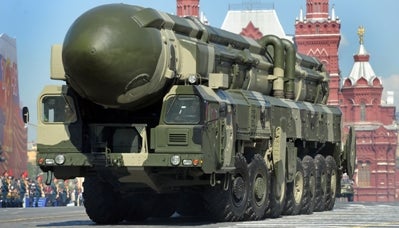Rose Gottemoeller, Acting Undersecretary for Arms Control and International Security, has reiterated the Administration’s commitment to nuclear arms control at the Getting to Zero Conference at Yale University.
In her view, nuclear weapons pose an existential threat to humanity regardless of who wields them, and global disarmament is necessary for global security. Not since Neville Chamberlain deplaned after arriving from Munich has such a dangerous fallacy been uttered. Neither of Gottemoeller’s statements could be further from the truth, and both are either egregious displays of naivety or wanton disregard of the facts.
Studies by The Heritage Foundation’s Nuclear Stability Working Group, which tested the effects that ballistic missile defenses have on arms control, show that, contrary to the views of Gottemoeller and the Administration, if a nation attempts to disarm, regional instability ensues as the balance of power shifts. In these scenarios, the use of nuclear force becomes more likely, not less.
The announcement by Gottemoeller also comes on the heels of an Administration decision to reduce the U.S. nuclear stockpile by as much as 80 percent. Such a reduction would give the both the Russians and Chinese nuclear superiority.
Looking beyond the fact that most nations will not surrender their nuclear arms, let us assume that through international agreements and laws, atomic weapons are made illegal and all nations agreed to disarm. While in Gottemoeller’s opinion this would result in a safer world, the idea that it would stop a rogue state from nuclear aggression is akin to saying that outlawing guns would end gun violence or that outlawing murder would end murder.
The Munich Agreement is again an apt comparison, as World War II began after the Nazis signed a peace treaty with Chamberlain in exchange for annexation of the Sudetenland. Only those nations that act in good-faith adherence to the law would disarm, and they would be at the mercy of those that do not.
Taking the hypothetical scenario one step further, assume that not one but two nations secretly retain or newly develop nuclear weapons in contravention of the law. If one of these nations attacks the other in a state of perceived weakness, nuclear retaliation is inevitable.
The goal of total nuclear disarmament is a fantasy of members of the Administration that will never happen. However, the United States’ current path of unilateral disarmament through New START and recent decisions by the Obama Administration can severely weaken our defenses and our influence in global affairs. America faces a defining choice: to go the way of the British Empire or to remain a superpower. Unilateral disarmament will ensure only decline—if not destruction.
Chris Gardner is a former staff writer for the Homeland Security NewsWire and current employee of The Heritage Foundation.
